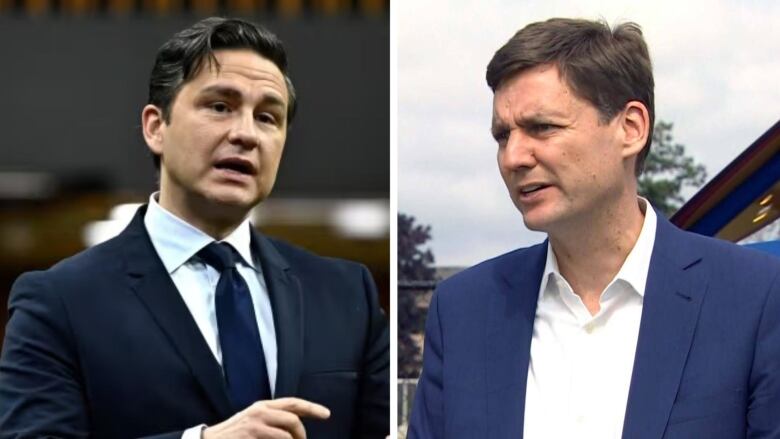Premier David Eby mocks Pierre Poilievre's letter asking B.C. to join carbon tax fight
Multiple provinces are calling for the program to end or be paused

B.C. Premier David Eby dismissed a letter from Opposition Conservative Leader Pierre Poilievre asking him to help halt a federal carbon tax increase calling it a "baloney factory" campaign tactic.
Poilievre's letter sent Friday asks Eby to join seven other premiers in opposing the April 1 tax increase, saying the 23 per cent hike amounts to an extra 18 cents on a litre of fueland people inB.C. and Canadians can't afford it.
"I am writing, asking that youdo not administer the April 1 tax hike," Poilievre said in the one-page letter. "Join the seven other premiers demanding (Prime Minister Justin) Trudeau stop the hike."
Poilievre's letter says the carbon tax system set up byTrudeau's government is an imposition on the provinces that requires them to accept an ever-increasing tax.
But Eby, speaking at an unrelated news conference in Terrace about 1,400 kilometres northwest of Vancouver, saysB.C. would end up with less money returned to the province if it accepted Poilievre'srequest.
"I don't live in the Pierre Poilievre campaign office and baloney factory," said Eby. "I live in B.C., am the premierand decisions have consequences. The fact we face is that if we followed Mr. Poilievre's suggestion there would be less money returned to British Columbians after April 1 than there would be if the federal government administered this increase directly."
B.C. introduced North America's first broad-based carbon tax in 2008, and will administer the coming tax increase on behalf of the federal government.
Poilievre's letter said people in B.C. and across Canada are in need of relief and not tax increases.
"It makes no difference to the hard-working people of B.C. who administers the tax, they still pay it," Poilievre said in the letter.
Canadians living in the eight provinces with the federal carbontax receive quarterly rebate payments, which varydepending on the province and the size of household.
Those provinces are Alberta, Saskatchewan, Manitoba, Ontario, New Brunswick, Nova Scotia, Prince Edward Island and Newfoundland and Labrador. The premiers of sevenprovinces, excludingManitoba, have asked the federal government to drop the April 1 increase.
Saskatchewansays it will also no longer remit the money it owes for the carbon price on natural gas, as required by law.
B.C., Quebec and the Northwest Territories follow their own carbon-pricing mechanisms that meet federal standards and are exempt from the federal program.
At the beginning of next month, the carbon price is scheduled to increase from $65 to $80 per tonne.
The federal policy which includes both a tax on fossil fuels and rebates paid directly to households was introduced by the Liberal government in 2019 and is designed as a financial incentive to encourage people and businesses to cut their consumption of fossil fuels and transition to greener forms of energy.
The federal government says80 per cent of households get more money back in rebatesthan they pay in carbon taxesdirectly.
With files from CBC News













_(720p).jpg)


 OFFICIAL HD MUSIC VIDEO.jpg)
.jpg)



























































































